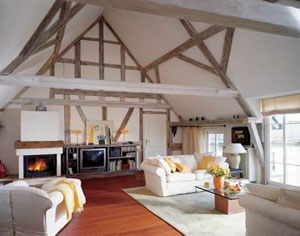如今高企的房價讓很多年輕人選擇購買小小的“蝸居”,但小居室如果布置得當,也能產(chǎn)生“大空間”,比如多采用冷色調(diào)、多裝鏡子、保持室內(nèi)光線充足……等等。下面就來看看讓小居室變大的幾個妙招吧。
Small Is Beautiful: Tips for Making a Room Look Larger
Since I graduated from college, I've lived in at least ten different apartments, and not one of them has been particularly spacious. Every time I move into a new place, I'm faced with the challenge of keeping my living quarters tranquil, open, and airy-seeming. Over the years, I've picked up a number of pointers for accomplishing this goal, and while I can't say they make my house look like a Malibu mansion, they're simple, satisfying tactics for creating the illusion of space—and keeping household messes at bay at the same time.
1. Eliminate clutter.
Knickknacks and bric-a-brac are the archenemies of a small-home resident. If you do have a collection of figurines or memorabilia that you simply can't bear to part with, a good rule of thumb is to select three to five items at a time to display, and keep the rest stored out of sight until you're ready to rotate in new pieces. This technique accomplishes the dual purpose of leaving more open surfaces in the room and of highlighting the aesthetic value of the individual collectibles on view. In addition, keep wall hangings to a minimum—one or two larger paintings overwhelm a cramped space less than clusters of small images do.
2. Select light, cool paint hues.

Dark, warm colors are useful in large rooms where people want to establish a sense of intimacy, but in small spaces, those hues are counterproductive. Instead, choose white or soft blue or green tones, which recede in a room and make it seem airy and more spacious.
3. Keep colors and patterns simple.
The greater the number of colors and patterns you have in a room, the more broken up the space will appear. Instead, by keeping your furniture, walls, and decorative fabrics (bedspreads, window treatments, rugs) within the same color family, you'll establish a more continuous aesthetic flow throughout the area.
4. Expose as much floor space as possible.
If you have wood floors, don't cover them with area rugs; either leave them exposed entirely or use a single area rug.
5. Let there be light.
Both natural and artificial light can work wonders in terms of opening up a small space. Allow as much light from the outside as possible to stream in through the room's windows, and choose sheer or thin window coverings so as not to hamper visitors' views of the expansive outdoors. Enhance the effect by installing ample lamps, track lighting, or recessed lighting.
6. Scale furniture to match the space.
Bulky pieces of furniture will only draw attention to how small a room is. The size of the furniture should be proportional to that of the space. In addition, keep furniture flat against walls and away from walkways as much as possible. Furniture that does need to be out on the floor—such as ottomans and coffee tables—will seem less obtrusive if it's lower to the ground; glass tables and chairs or sofas with open arms and legs are also useful for making a space seem larger. Choose only furniture that seems vital to the function of the particular room—in other words, if you have a small bedroom, it's probably best not to place a decorative bench at the foot of the bed.
7. Take advantage of reflective surfaces.
Mirrors brighten any room by reflecting both natural and artificial light. Choose a focal point in the space you want to enlarge, and then angle mirrors and glass furniture strategically toward it to create the appearance of depth. Mirrors placed near windows can be especially effective, as they'll direct strong light from the outdoors into the center of the room.
Keep It Simple
Small rooms in your residence can be every bit as comfortable and inviting as larger ones, provided that you take a little extra care to organize the space effectively. By strategically arranging furniture and decorations, erring on the side of minimalism, and opening up the area to all the light available, you'll ensure that your little house feels like a real home.
相關(guān)閱讀
盤點老來得子的九大男明星
一周七天的英文說法來歷
你知道喝酒碰杯的來歷嗎?
你被“虛構(gòu)”的記憶騙過嗎?
(來源:原版英語 編輯:Julie)